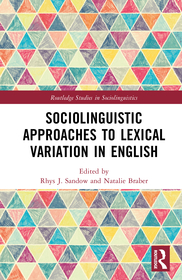
Sociolinguistic Approaches to Lexical Variation in English
Series: Routledge Studies in Sociolinguistics;
- Publisher's listprice GBP 145.00
-
69 273 Ft (65 975 Ft + 5% VAT)
The price is estimated because at the time of ordering we do not know what conversion rates will apply to HUF / product currency when the book arrives. In case HUF is weaker, the price increases slightly, in case HUF is stronger, the price goes lower slightly.
- Discount 10% (cc. 6 927 Ft off)
- Discounted price 62 346 Ft (59 378 Ft + 5% VAT)
Subcribe now and take benefit of a favourable price.
Subscribe
69 273 Ft

Availability
Not yet published.
Why don't you give exact delivery time?
Delivery time is estimated on our previous experiences. We give estimations only, because we order from outside Hungary, and the delivery time mainly depends on how quickly the publisher supplies the book. Faster or slower deliveries both happen, but we do our best to supply as quickly as possible.
Product details:
- Edition number 1
- Publisher Routledge
- Date of Publication 27 November 2025
- ISBN 9781032835259
- Binding Hardback
- No. of pages348 pages
- Size 229x152 mm
- Language English
- Illustrations 68 Illustrations, black & white; 12 Halftones, black & white; 56 Line drawings, black & white; 50 Tables, black & white 700
Categories
Short description:
This collection presents the state of the art in the fast-developing area of the study of lexical variation from sociolinguistic perspectives, drawing on a range of examples in the English language to redress the gap around lexis-focused research within sociolinguistics.
More
Long description:
This volume offers an in-depth and up-to-date exploration of lexical variation from sociolinguistic perspectives, addressing a notable gap in lexis-focused research within the field. Drawing on a wide array of examples from the English language, the collection showcases cutting-edge approaches to understanding how lexical variation operates across different social and linguistic contexts.
Organised into three thematic sections, the book begins with a focus on contemporary developments in dialectology. The first section not only highlights regional and social variation in lexis but also offers critical insights into the methodological innovations shaping 21st-century dialect research. The second section highlights innovative perspectives emerging from corpus linguistics, wheras the final section examines lexical variation through the lens of social meaning, including contributions from third-wave variationist sociolinguistics. Together, these chapters argue for the significance of lexical analysis in sociolinguistic inquiry – both as a window into society and as a means of uncovering mechanisms of language variation and change.
This collection will be a valuable resource for students, researchers, and scholars in language variation and change, dialectology, corpus linguistics, and sociolinguistics more broadly.
MoreTable of Contents:
Foreword: The Cinderella of sociolinguistics – Joan C. Beal; Acknowledgements; 1. Introduction: An overview of sociolinguistic approaches to lexical variation in English – Rhys J. Sandow and Natalie Braber. Section I: Dialectology 2. A socio-geographical investigation of lexical variability in England: Evidence from the English Dialects App – David Britain, Tamsin Blaxter and Adrian Leemann; 3. Lexical variation among mobile speakers: A case study of words for bread in the United Kingdom – George Bailey, Laurel MacKenzie and Danielle Turton; 4. Welsh-English social-media lexicon in comparative context: Adjectives of positive evaluation and terms of address – David Willis; 5. Lexical variation in Irish English – Raymond Hickey; 6. ‘Pit talk’ of UK coal miners – a comparative study – Natalie Braber and John Bellamy. Section II: Corpus linguistics 7. Lexico-grammatical variation in spoken British English corpora – Robbie Love and Nele Põldvere; 8. Light verbs on the contact continuum – Gabriel Ozón and Melanie Green; 9. The social conditioning of lexical items for man in British English: The demise of man and the rise of guy – James M. Stratton; 10. Conceptual variation: Gendered differences in the lexicalization of the concept of COMMODITY in environmental narratives – Justyna A. Robinson, Rhys J. Sandow and Albertus Andito; 11. ‘Our speech defines us’: The language of Caribbean female prime ministers – Guyanne Wilson. Section III: Social meaning 12. Bare social meanings: The production and perception of the quantifier bare – Rhys J. Sandow, Christian Ilbury, George Bailey, and Natalie Braber; 13. A word in a word: Social perceptions of expletive infixation – Matthew Hunt and Linnaea Stockall; 14. ‘Well first of all, you spelled sus wrong’: Epistemic authority and the social negotiation of ‘slang’ – Teresa Pratt; 15. Disenregistering dude: Shifts in familiarizing vocative meaning and use in American English – Scott F. Kiesling and Soobin Choi; 16. ‘TikTok Slang’: Lexical variation and change in social media – Christian Ilbury; 17. Perspectives on lexical variation of English in Vietnam – John Bellamy and Mai Xuan Nhat Chi Nguyen
More



